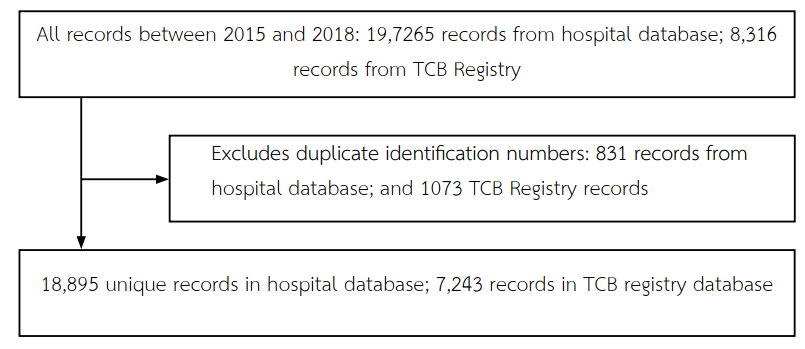Validity of Data in Thai Cancer-based Registry Compared with Original Data from One Tertiary Care Hospital Database
Keywords:
validity, cancer database, hospital databaseAbstract
Background: Nowadays, cancer patients' data is electronically transferred to the Thai cancer base registry by the Thai Cancer Based Program, but some data were manually input causing data errors in the cancer registry database.
Objectives: This study aims to verify the basic data of cancer patients in the cancer registry database and compare them with the original data from electronic medical record database from the hospital.
Method: The research used the basic cancer data between 2015-2018 from the cancer registry database and basic data from outpatient and inpatient database from one tertiary hospital. The data were linked by using deterministic record linkage. Data were analyzed by the percentage of agreement.
Results: There are 26,138 records from both databases. Of 84 variables analyzed, we found perfect agreement on the pathological card number, recurrent, bilaterality, stage, and extend variables. The validity of personal data variables ranges from 63.29 to 99.99 percent, the tumor-related variables 51.19 to 100 percent, treatment-related variables 63.29 to 96.60 percent, and follow-up data-related variables 17.99 to 96.86 percent.
Conclusion: Basic data of patients from the cancer registry database show various validities. Variables with low agreement should be corrected. In addition, validation process must be implemented.
Downloads
References
International Agency for Research on Cancer (WHO). Cancer Today. 2020.
Pongpirul K, Supachutikul A, Sriratanabon J. The use of computerized information system in hospital and quality of care. Health Systems Research Institute; 2005.
Nikomborirak D, Paibunjitt-aree W, Srisuwannaket T, Saelawong T. A Study on the Efficacy of Health Care Management under the Committee on Drugs and Health Care Reimbursement System Management. Health Intervention and Technology Assessment Program. Health System Research Institiute; 2014.
Sriphlang H. Analyze the Quality of Cancer Data and Study the Cancer Situation and Its Relationship to Trends and the Distribution of Risk Factors from Various Sources. National Health Information System Development Program; 2010.
National Cancer Institue (Thailand), Ministry of Public Health. Definition of Indicators of Service Plan Cancer Field 2561-2565. 2558.
Department of Medical Services, Ministry of Public Health. Handbook of Cancer Registry. 2558.
Zhu Y, Matsuyama Y, Ohashi Y, Setoguchi S. When to conduct probabilistic linkage vs. deterministic linkage? A simulation study. J Biomed Inform. 2015;56:80-86.
Izquierdo JN, Schoenbach VJ. The potential and limitations of data from population-based state cancer registries. Am J Public Health. 2000;90(5):695.
Duggan MA, Anderson WF, Altekruse S, Penberthy L, Sherman ME. The Surveillance, Epidemiology, and End Results (SEER) Program and Pathology: Toward Strengthening the Critical Relationship. Am J Surg Pathol. 2016;40(12):e94-e102.
Donnelly C, Cairnduff V, Chen JJ, Kearney T, Fitzpatrick D, Fox C, et al. The completeness and timeliness of cancer registration and the implications for measuring cancer burden. Cancer Epidemiol. 2017;49:101-107.
Bray F, Parkin DM. Evaluation of data quality in the cancer registry: principles and methods. Part I: comparability, validity and timeliness. Eur J Cancer. 2009;45(5):747-755.
Fung JW, Lim SB, Zheng H, Ho WY, Lee BG, Chow KY, et al. Data quality at the Singapore Cancer Registry: An overview of comparability, completeness, validity and timeliness. Cancer Epidemiol. 2016;43:76-86.
Löfgren L, Eloranta S, Krawiec K, Asterkvist A, Lönnqvist C, Sandelin K. Validation of data quality in the Swedish National Register for Breast Cancer. BMC Public Health. 2019;19(1):495.
Moberger P, Sköldberg F, Birgisson H. Evaluation of the Swedish Colorectal Cancer Registry: an overview of completeness, timeliness, comparability and validity. Acta Oncol. 2018;57(12):1611-1621.
Kijsanayotin B, Kasitipradith N, Pannarunothai S. eHealth in Thailand: the current status. Stud Health Technol Inform. 2010;160(Pt 1):376-380.
Kao WH, Hong JH, See LC, Yu HP, Hsu JT, Chou IJ, et al. Validity of cancer diagnosis in the National Health Insurance database compared with the linked National Cancer Registry in Taiwan. Pharmacoepidemiol Drug Saf. 2018;27(10):1060-1066.

Downloads
Published
How to Cite
Issue
Section
License
Copyright (c) 2022 Chulabhorn Royal Academy

This work is licensed under a Creative Commons Attribution-NonCommercial-NoDerivatives 4.0 International License.
Copyright and Disclaimer
Articles published in this journal are the copyright of Chulabhorn Royal Academy.
The opinions expressed in each article are those of the individual authors and do not necessarily reflect the views of Chulabhorn Royal Academy or any other faculty members of the Academy. The authors are fully responsible for all content in their respective articles. In the event of any errors or inaccuracies, the responsibility lies solely with the individual authors.


